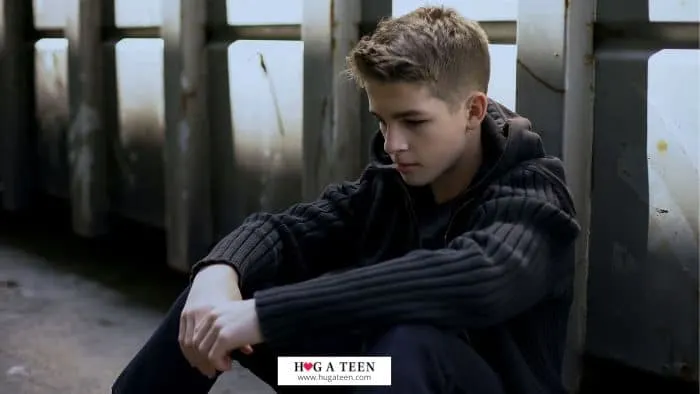Breaking up is never easy, and it can be especially tough for teenagers. The emotions, hormones, and social pressures of adolescence can make breakups even more traumatic. So what are the most common reasons for teenage breakups?
In this article, we’ll dive into why teenage relationships typically end and explore what makes these breakups so tough. From differences in values to conflicts with friends and family, we’ll take a look at the many factors that can lead to a breakup.
So grab a tissue, and let’s start exploring why teenage love so often goes awry.
- Most Common Reasons For Teenage Breakups
- 1. Bad communication skills
- 2. Lack of maturity
- 3. First Love
- 4. Disapproval From Parents
- 5. Too Much Fighting
- 6. Too Much Focus On Appearance
- 7. Incompatibility
- 8. Attracted To Another Person
- 9. Incompatible Schedules
- 10. Lack Of Space
- 11. Interference From Friends
- 12. Peer Pressure
- 13. Different Expectations
- 14. Disagreement On Sex Or Intimacy
- 15. Age Difference
- 16. Changes In Life
- 17. Stress
- 18. Deception
- 19. Teenage Cheaters
- 20. Lack Of Trust
- 21. Unrealistic Expectations
- 22. Toxic Behavior
- 23. The Long-Distance Hurdle
- 24. Financial Issues
- 25. Moral Values
- 26. Lack Of Time
- 27. Wanting Attention
- Teenage Breakups And Getting Back Together
- Next Steps After A Break-Up
❤️ You might also like to read some inspirational teenage breakup quotes to help uplift your teen after a breakup.
Most Common Reasons For Teenage Breakups

1. Bad communication skills
Regardless of how much teens chat, they may not know how to express themselves clearly or understand each other’s perspectives. For teenagers to build healthy, long-term relationships they need to reach a certain level of emotional maturity and develop better methods of communication.
2. Lack of maturity
Maturity levels can vary greatly among teens. When one person is ready to move forward with the relationship but the other isn’t, it can cause frustration and arguments. This is often the case when one person is ready for a more serious commitment, but the other isn’t.
3. First Love
First loves can be intense but they don’t always last. Sometimes teens realize that their first love wasn’t actually the right person for them, or they grow apart as they mature and change. While it can be difficult to move on from your first love, it’s important to remember that it’s just a part of growing up.
4. Disapproval From Parents
Parents can play a big role in their children’s relationships, especially when they’re teenagers. If a couple’s parents don’t approve of their relationship, it can cause a lot of romantic stress and conflict. The couple may try to hide the relationship from their parents, which can lead to lying and sneaking around. If the relationship is strong, they may try to work through the disapproval, but if it’s not, it could lead to a breakup.
5. Too Much Fighting
Fighting is a normal part of any relationship, but if it becomes a pattern it’s a sign that something is wrong. Constant arguing and not being able to work out their differences can put a lot of stress on the relationship. If they can’t find a way to resolve their conflicts and move forward, the relationship may not last.
❤️ You might also be interested in finding out what percentage of high school relationships last.
6. Too Much Focus On Appearance
Appearance can be a big factor in teen relationships but it’s important to remember that looks aren’t everything. If a couple is too focused on appearance, it can lead to shallow and unsatisfying relationships. Relationships should be based on more than just physical attraction. If that’s all a couple has it’s unlikely to last in the long run.
7. Incompatibility
A teenager’s relationship can also end when they are not compatible with one another. It could be personality differences, different world views, intimacy levels, or sharing several hobbies/interests that could help strengthen a relationship.
8. Attracted To Another Person
Crushes and attractions happen, and sometimes they can lead to a breakup. When one person starts developing feelings for someone else it can cause them to reevaluate their current relationship. This can be a difficult situation, especially when the attraction is mutual.
❤️ You might also like to read: Interesting Psychological Facts About Crushes
9. Incompatible Schedules
Inconsistent schedules can also be a reason for a breakup. Teens have a lot going on with school, clubs, sports, and possibly even a part-time job. When partners have conflicting schedules it can lead to frustration and a sense of distance between them. It’s important for both partners to find a way to spend time with each other and stay connected, despite their busy schedules.
10. Lack Of Space
Teens need their space and independence, and if they feel suffocated or like their romantic partner is constantly in their personal space, it can cause tension and arguments. Relationships work best when both partners are able to have some alone time to recharge.
11. Interference From Friends
Interference from friends can also be a reason for a breakup. Friends getting involved in the relationship can cause tension and conflict. Whether it’s giving unsolicited advice or trying to control the relationship, friends can disrupt the connection between the partners. Teens are often not mature enough to not let outside influences dictate their relationship.
12. Peer Pressure
Peer pressure is a powerful force, especially during the teenage years. When teens are pressured by their friends to participate in events that might exclude their crush, it can cause them to make a decision they wouldn’t normally make. This type of breakup can often be temporary and is often due to external factors rather than a real issue in the relationship.

13. Different Expectations
A breakup can result when both partners have different expectations for the relationship. For example, one person may want to move forward with a serious commitment, while the other is only looking for a casual relationship. It’s important for both partners to have a clear understanding of what they want from the relationship.
14. Disagreement On Sex Or Intimacy
Disagreements about sex or intimacy can be a major factor in teenage breakups. When one person is ready to move forward with a sexual relationship but the other isn’t, it can cause tension and conflict. This can be due to religious or personal beliefs or simply a lack of comfort with each other. It’s important for both partners to communicate their needs and feelings and find a way to compromise.
15. Age Difference
Teenagers mature at different ages, so dating someone younger or older than you can have a major effect on your relationship. You might not be able to participate in similar events or be ready to engage in a more serious relationship.
16. Changes In Life
Changes in life can also be a reason for a breakup. When people experience major life events, such as starting college or a change of school, it can change their priorities and perspective. This can cause a shift in the relationship, leading to a lack of communication and disconnection between the partners. In order to maintain a healthy relationship, it’s important for both partners to talk about the changes and work together to find a solution.
17. Stress
Stress can be a big factor in teenage breakups. Whether it’s from school, family, or personal problems, stress can put a lot of pressure on a relationship. When one person is feeling overwhelmed it can be hard for them to focus on the relationship and give it the attention it deserves.
18. Deception
Lying or concealing information from each other can lead to a breakdown in trust and teenage breakups. It can include lying about where they are, who they’re hanging out with, or even how they feel about their partner.
19. Teenage Cheaters
Cheating can be a major factor in teenage breakups. When one partner is unfaithful, it can cause a breakdown in trust and a loss of intimacy. Cheating is a serious issue that can cause long-lasting emotional damage, and it’s important for both partners to take steps to heal and move forward.
❤️ Suggested reading: How To Make A Guy Regret Ghosting You
20. Lack Of Trust
Breakups between teenagers can be triggered by a lack of trust. Teens are exposed to many other teenagers through school, clubs, and through social media. While still navigating who they are and what their ideal partner might look like, they may spend time chatting with other people, which could make their partner feel insecure. A lack of trust can cause a breakdown in communication and intimacy.
21. Unrealistic Expectations
Unrealistic expectations can be a reason for a breakup. When partners have expectations that are too high or unrealistic, it can cause disappointment. This can lead to frustration and a sense of disconnection between the partners. In order to maintain a healthy relationship it’s important for both partners to talk about their expectations and find a way to reconcile their differences.
22. Toxic Behavior
Toxicity can also be a reason for a breakup. Partners engaging in toxic behaviors, such as being controlling, manipulative, or abusive relationships, are common causes or relationship failure.
❤️ Suggested reading: How Does A Guy Feel When You Block Him?
23. The Long-Distance Hurdle
Long-distance relationships can be challenging for teenage couples. When partners live far apart from each other it can be difficult to maintain a strong emotional connection and communicate effectively.
24. Financial Issues
Financial issues can also be a reason for a breakup. When partners disagree on how to manage money or have expectations beyond their partner’s financial means, it can cause conflicts that lead to a breakup. Teenagers in high school are just starting to understand the value of money, and if one partner is not willing to compromise, it’s common for them to break up.
25. Moral Values
Differing values and beliefs can put a big strain on a relationship. Teenagers are still figuring out who they are and what they stand for, and if they don’t align with their partner, it can cause major conflicts. For example, one person might be against premarital sex, while the other might be more open to it. If they can’t find common ground, the relationship may not last.
26. Lack Of Time
When you’re a teenager, you have a lot on your plate between school, sports, clubs, and socializing with friends. Finding time for a relationship can be tough, and if one person is more committed to the relationship than the other, it can lead to a breakup. If a couple isn’t able to make time for each other, it’s a sign that the relationship might not be as strong as it could be.
27. Wanting Attention
When teenagers are feeling insecure and want to feel accepted, they often start a relationship in an effort to get attention from their crush, only to realize that they don’t actually care for them. Whenever this happens, the relationship is built on an incorrect foundation, and it will likely end as soon as the attention wears off.
Teenage Breakups And Getting Back Together

What percentage of breakups get back together?
According to a study published in the Journal of Adolescent Research in 2013, 44% of young adults aged 17 to 24 experienced at least one reconciliation with an ex-romantic partner.
However, according to a 2022 survey, only 14.94% of participants who got their ex back stayed together.
In the majority of cases, teenagers will break up and get back together two times or more.
A good percentage of people get back together since the initial reasons and feelings for getting into a romantic relationship always linger, even after a breakup or ongoing relationship challenges. Once the two individuals have taken a deliberate reflection and have both figured out what they want with their lives, they might get back together to see if things will work out better.
How long should a breakup last before getting back together?
There isn’t a defined period or duration that you’re supposed to wait before getting back together with your ex.
If you broke up over something really trivial, you may be able to patch things up in a day or two. However, if you broke up over something more serious, it’s best to take a month apart so that you can calm down and get perspective on the situation
It can be weeks, months, or up to a year or more; it all comes down to your adjustment over time and whether you have healed, changed, and are willing to give yourself a second chance at love by working through your relationship difficulties.
How do you know your ex isn’t coming back?
You will know your ex is not coming back if, after your break up, they inform you to move on, then go ahead and cut off all communication with you, or they get into an intimate relationship with someone else. They also don’t seem to mind or be bothered when they see you with someone else and are not willing to work through your relationship difficulties.
Next Steps After A Break-Up

Although adolescent romance is an important developmental marker for a teenager’s self-identity, and capacity for intimacy, it can cause immense emotional stress when the relationship ends.
When relationship breakups lead to depression, it’s important to ensure mental health care. If depression symptoms worsen or disrupt their everyday life, consult a mental health professional who can help them process their feelings.
Read our next article, where we look at the effects of teenage break-ups, the risk factors associated with them, and ways that parents can help their teen deal with a breakup.
